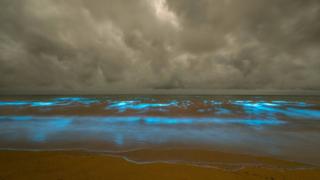 Image copyright
Image copyright
Brett Chatwin
The spectacle has drawn photographers to a Tasmanian bay
A large algal bloom has transformed an Australian beach into a glowing bright blue.
The bioluminescent algae, commonly called sea sparkle, has delighted locals at Tasmania’s Preservation Bay.
The natural phenomenon occurs when the tiny organisms emit light as a defence mechanism, according to an expert. It is typically seen in calm waters.
Although not toxic, the algae can cause skin irritations in some people.
“The whole bay was iridescent blue,” said Brett Chatwin, who photographed the spectacle near his home.
“I was gobsmacked. It was just an amazing sight.”
Image copyright
Brett Chatwin
The algae is not dangerous, but can irritate skin
Officially called Noctiluca scintillans, the species uses bioluminescence for protection, said aquatic botanist Prof Gustaaf Hallegraeff.
“It acts a bit like a burglar alarm,” he told the BBC.
“Something wants to eat you, you flash at it and then you scare it away.”
Prof Hallegraeff, from the University of Tasmania, said it could also disrupt the food chain.
“If you have a big bloom like that it behaves like a vacuum cleaner, it eats everything away,” he said.
You might also be interested in:
- The interrupted interview – take two
- Boaty McBoatface submarine set for first voyage
- ‘Don’t bag up dog poo in countryside’
Mr Chatwin said he had not seen the algae near his home before.
“We’ve had virtually not a breath of wind for two weeks,” he said.
In 2012, Sydney’s famous Bondi Beach was closed after the same algae species turned the sea a shade of red.
‘Sea sparkle’ algae lights up Tasmanian beach}

